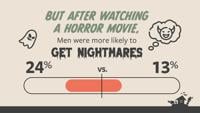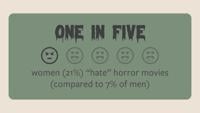
Ben Maguire
Three in 10 American adults are still afraid of the dark, according to new research.
The survey of 2,000 general population Americans revealed 29% of respondents admitted they still have a fear of the dark, with men slightly more likely than women to have this fear (33% vs. 26%).
A quarter of respondents (24%) sleep with a nightlight, potentially to help combat this, while 10% sleep with the lights on — with twice as many men doing this (15% vs. 7%).
One in 10 (11%) also still sleeps with a stuffed animal or other comfort item.
Conducted by Talker Research on behalf of Avocado Green Mattress, the survey looked at how scary movies — especially in the lead-up to Halloween — can affect this fear of the dark.
Overall, 28% of respondents said they “love” watching horror movies and try to watch as many as they can.
Men were more likely to love horror movies (33% vs. 24%) — and on the other end of the scale, one in five women (21%) said they “hate” horror movies (compared to 7% of men).

Research shows men are more likely to get nightmares after watching a horror movie. (Talker Research)
For those who watch horror movies, women were more likely to be scared both during and after the movie (41% vs. 28%).
But after watching a horror movie, men were more likely to get nightmares — with 24% admitting they “always” or “often” have nightmares, compared to 13% of women.
An increase in nightmares wasn’t the only way horror movies impact Americans’ sleep, either.
Data found after watching a horror movie, many respondents were more likely to wake up during the night (28%), have lower-quality sleep (22%) and sleep for fewer hours (12%).

(Photo by Ron Lach via Pexels)
“With everything in October’s ‘spooky season’ — from horror movies to haunted houses and other Halloween celebrations — it’s no wonder that some Americans aren’t sleeping as well this month,” said Laura Scott, director of brand marketing at Avocado Green Mattress. “People may be staying up later to celebrate in the weeks leading up to Halloween, and especially if they’re watching horror movies, our data shows their sleep may suffer as a result.”
The survey also looked at Daylight Saving Time, which ends on Sunday, Nov. 2, asking respondents about any expected impact on their sleep.
Respondents were unclear about the time change — 32% incorrectly believed an hour of sleep would be lost, while 13% weren’t sure.
And a fifth of Americans surveyed said it would take more than a week for them to adjust to the time change.

A study found that one in five women "hate" horror movies. (Talker Research)
Thirty-nine percent said the trade-off — an extra hour of sleep for less light in the evenings — is worth it, but 62% said they would get rid of the time change altogether if they could.
A study in 2024 found similar results: 35% said the trade-off was worth it, while 59% would prefer to stop changing the clocks for Daylight Saving Time.
“Beyond Halloween and horror movies, we also have the end of Daylight Saving Time to prepare for in the coming weeks,” said Scott. “It’s no surprise to us that the majority of people surveyed would rather get rid of the time change — not only did our data also reflect this sentiment last year, but we understand how difficult it can be to adjust, even when it’s just an hour change.
“Making sure to get a good night’s sleep in the days leading up to the time change can help your body adjust — as well as switching your clocks as soon as you get up, to help your mind focus on the ‘new’ time.”

(Photo by cottonbro studio via Pexels)
Survey methodology:
Talker Research surveyed 2,000 general population Americans; the survey was commissioned by Avocado Green Mattress and administered and conducted online by Talker Research between Sept. 17– 22, 2025.
We are sourcing from a non-probability frame and the two main sources we use are:
- Traditional online access panels — where respondents opt-in to take part in online market research for an incentive
- Programmatic — where respondents are online and are given the option to take part in a survey to receive a virtual incentive usually related to the online activity they are engaging in
Those who did not fit the specified sample were terminated from the survey. As the survey is fielded, dynamic online sampling is used, adjusting targeting to achieve the quotas specified as part of the sampling plan.
Regardless of which sources a respondent came from, they were directed to an Online Survey, where the survey was conducted in English; a link to the questionnaire can be shared upon request. Respondents were awarded points for completing the survey. These points have a small cash-equivalent monetary value.
Cells are only reported on for analysis if they have a minimum of 80 respondents, and statistical significance is calculated at the 95% level. Data is not weighted, but quotas and other parameters are put in place to reach the desired sample.
Interviews are excluded from the final analysis if they failed quality-checking measures. This includes:
- Speeders: Respondents who complete the survey in a time that is quicker than one-third of the median length of interview are disqualified as speeders
- Open ends: All verbatim responses (full open-ended questions as well as other please specify options) are checked for inappropriate or irrelevant text
- Bots: Captcha is enabled on surveys, which allows the research team to identify and disqualify bots
- Duplicates: Survey software has “deduping” based on digital fingerprinting, which ensures nobody is allowed to take the survey more than once
It is worth noting that this survey was only available to individuals with internet access, and the results may not be generalizable to those without internet access.






















(0) comments
Welcome to the discussion.
Log In
Keep it Clean. Please avoid obscene, vulgar, lewd, racist or sexually-oriented language.
PLEASE TURN OFF YOUR CAPS LOCK.
Don't Threaten. Threats of harming another person will not be tolerated.
Be Truthful. Don't knowingly lie about anyone or anything.
Be Nice. No racism, sexism or any sort of -ism that is degrading to another person.
Be Proactive. Use the 'Report' link on each comment to let us know of abusive posts.
Share with Us. We'd love to hear eyewitness accounts, the history behind an article.